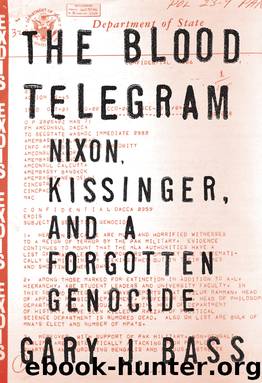The Blood Telegram by Gary J. Bass

Author:Gary J. Bass [Bass, Gary J.]
Language: eng
Format: epub, mobi, azw3
ISBN: 978-0-385-35047-1
Publisher: Knopf Doubleday Publishing Group
Published: 2013-09-23T16:00:00+00:00
KISSINGER IN CRISIS
Henry Kissinger has burnished the image of himself as supremely coolheaded in a crisis—the real person you want to get that phone call at three o’clock in the morning. But to Nixon and his senior team, Kissinger, already worn out from the strain of handling the China opening and the Vietnam War, appeared to be coming frighteningly unglued. After months dedicating himself to preventing a major war, he had failed. His voice was shot, which Nixon thought was due to tension. He seemed exhausted and irrational.23
Alone in the Oval Office with H. R. Haldeman, the president suggested—in an empathetic, almost fatherly tone—that Kissinger’s problem was “maybe deep down recognizing his own failure. Now that’s what my guess is.” Haldeman agreed it was “a self-guilt thing.” Nixon said, “I think he’s gotten emotional. He sounded awfully fatigued to me.” Haldeman agreed that the “overexcited” Kissinger got “over-depressed about his failures.”24
Nixon, fatalistically convinced that nothing could have been done to prevent the war, said Kissinger “feels very badly about this thing, because he always has a feeling that something we have done could have avoided it.” After yet another tiff with the State Department, Kissinger stormed into Haldeman’s office to say he would have to resign. “He’s mixed up,” said an exasperated Nixon. “He’s tormented internally,” agreed Haldeman. A few weeks later, after press criticism about anti-Indian policies set Kissinger off again, the president’s aide John Ehrlichman noted, “Nixon wondered aloud if Henry needed psychiatric care.”25
Enervated and humiliated, out of favor with the president, Kissinger became erratic in his behavior. In his fury, he turned apocalyptic, invoking the 1930s in ways that spooked even the most rock-ribbed White House officials. Haldeman warned Nixon that a “raging” Kissinger “talks about Chamberlain, and how this is our Rhineland.” Even Haldeman, no squish, recoiled at Kissinger’s “doomsday” talk of World War II. He dismissed the analogy of “Germany taking the Rhineland or something like that, but I mean there’s a little difference there. India doesn’t have a plan for world conquest.”26
Nixon pointed out that Kissinger, scapegoating the bureaucracy, “really has the inability to see that … he himself is ever wrong.” George H. W. Bush found Kissinger paranoid and out of control. “Henry is very excitable, very emotional almost,” he wrote privately. While admiring Kissinger’s intelligence and wit, he noted that he “is absolutely brutal on these [State Department] guys, insisting that they don’t know anything and asking why they are screwing up policy etc. I went through that, and … had a little bit of a battle myself.”27
So the war arrived with Kissinger seeking vindication, needing a win to bolster his standing with the president. For all his commitment to dispassionate realpolitik, he seemed propelled almost as much by emotion as by calculation. He would not admit that the United States had missed opportunities to avoid war by pressuring Pakistan. Despite having spent months denying that the United States bore responsibility for Pakistan’s actions, he now wholeheartedly blamed the Soviet Union for India’s.
Download
The Blood Telegram by Gary J. Bass.mobi
The Blood Telegram by Gary J. Bass.azw3
This site does not store any files on its server. We only index and link to content provided by other sites. Please contact the content providers to delete copyright contents if any and email us, we'll remove relevant links or contents immediately.
| Arms Control | Diplomacy |
| Security | Trades & Tariffs |
| Treaties | African |
| Asian | Australian & Oceanian |
| Canadian | Caribbean & Latin American |
| European | Middle Eastern |
| Russian & Former Soviet Union |
The Secret History by Donna Tartt(16608)
The Social Justice Warrior Handbook by Lisa De Pasquale(11485)
Thirteen Reasons Why by Jay Asher(7782)
This Is How You Lose Her by Junot Diaz(5753)
Weapons of Math Destruction by Cathy O'Neil(5029)
Zero to One by Peter Thiel(4817)
The Myth of the Strong Leader by Archie Brown(4785)
Promise Me, Dad by Joe Biden(4440)
Stone's Rules by Roger Stone(4412)
Beartown by Fredrik Backman(4403)
How Democracies Die by Steven Levitsky & Daniel Ziblatt(4392)
The Fire Next Time by James Baldwin(4336)
100 Deadly Skills by Clint Emerson(4070)
A Higher Loyalty: Truth, Lies, and Leadership by James Comey(4024)
Rise and Kill First by Ronen Bergman(4008)
The David Icke Guide to the Global Conspiracy (and how to end it) by David Icke(3875)
The Farm by Tom Rob Smith(3869)
Secrecy World by Jake Bernstein(3773)
The Doomsday Machine by Daniel Ellsberg(3725)
